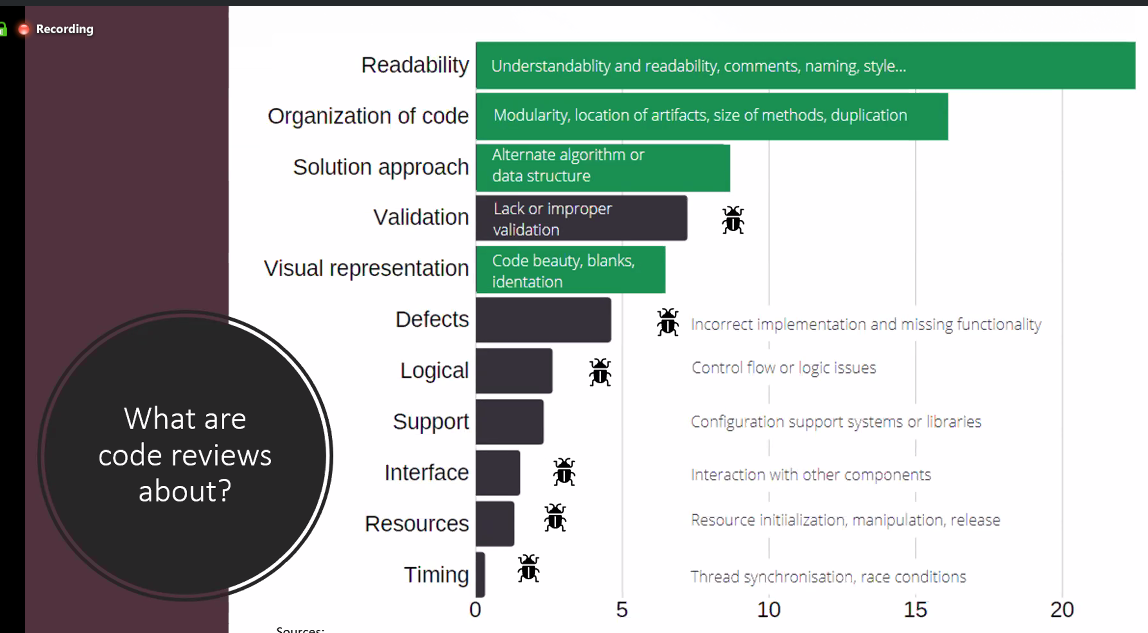I attended a great webinar led by Dr. Michaela Greiler on code reviews. I had my own opinions going in, of course, but I learned a lot and had a number of questions that I had (and didn't know I had) answered.
< Notes >
Why do code reviews?
- Finding defects? Knowledge sharing?
- Microsoft says: code improvements and finding defects
- Unreviewed code is 2x more likely to introduce defects
- 80% of code reviews lead to code improvements
- Only 15% of issues related to defects
- What are code reviews about? (decreasing percentage of issues)
- Readability - 25%
- Organization of code
- Solution approach
- Validation
- Visual representation
- Defects - 5%

What are the pain points?
- Timing - interruptions, waiting, context switch
- Social - bullying, conflicts/attacks
- Low feedback quality
- Value vs speed (quadrant)
- Want: thorough reviews delivered in a timely manner
Successful reviews
- Increase process speed + reduce reviewer burden
- Reduce reviewer burden
- Microsoft:
- Self-review - read through the changes before submission
- Small reviews - small, incremental changes
- Coherence - cluster related changes
- Context - describe the purpose/motivation
- Success - set-up for success through training and education for the reviewer (what should I look at
- Size:
- Fundamental and impactful
- 200-400 LOC maximum
- Number of files affected inversely proportional to feedback quality
- Microsoft:
- Tests - write and run tests before submitting
- Automation - automate everything possible
- Tools - review tools, CI/CD
- Skip/Indicate - skip unnecessary reviews, author indicates potential impact
- Reviewer selection - select the right reviewer and not too many
- Google:
- Every change is reviewed; max 4 hour review cycle 😮 (MS: 24h)
- 90% of all code changes comprise less than 10 files/24 LOC
- Clear approval criteria (ownership of code and readability); 75% of reviews are approved by 1 dev
- Microsoft:
Summary
- Small, coherent changes
- Continuous feedback cycle on code reviews
- Automation and tools
- Clear guidelines and policies
- Education and training
Questions
Is it important for the PR itself to be small or does several small, incremental commits as a part of a single larger PR still burden-reducing?
- Stacked commits
- Design review activity to use separate branches (?)
Should test code be reviewed differently than functional code? Does that account for the suggested LOC maximum?
- Different focus but tests need dedication
- Flaky/non-deterministic tests are problematic, time-consuming
- Review test code with the same rigor as functional code but different mindset
< Take-Aways >
This webinar could not have come at a better time. My team at Auth0 was taking a critical look at our review process and I learned a number of things that would be helpful for us to craft a better review process.
First, we gathered pain points from the team about our current process. We asked:
- What makes you nervous when submitting code?
- What makes you nervous when submitting a review?
- What are you unsure about?
- What's something that you or a teammate does that everyone should do?
A few examples of what we got back:
- Not sure how often to check the queue or how soon we can ping who we are waiting on.
- What's the process to re-request a review? Does using the GitHub UI work for everyone?
- Not sure how to deal with legacy issues that are not in-scope for this change
- How do I indicate a "nice to have" change that does not block a merge?
- What's the absolute maximum size of a PR?
- How many reviews do we need? How do we handle mutli-person reviews?
- Who resolves the comments, author or placer?
As of this writing, we were still in the process of figuring out the details but the webinar was a big help in giving us perspective and approaches from other companies.
< Take Action >
Comment via:
Subscribe via:
< Read More >
Tags
Newer

Feb 09, 2020
Taking WordPress to Eleventy
How I converted 12 years of posts in WordPress to an Eleventy static site ... and loved every minute of it.
Older

Oct 31, 2019
Learnings from Full Time Primary Interrupt (On-Call)
What I learned spending a month as the primary on-call for an open source support team.